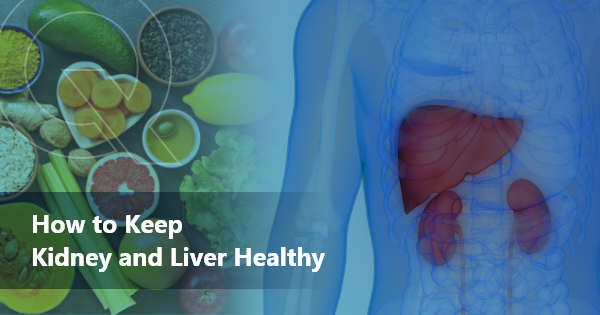The kidneys and liver are vital organs that play crucial roles in filtering and detoxifying the body. Ensuring their health is essential for overall well-being. This comprehensive guide provides practical tips and lifestyle adjustments to promote kidney and liver health, reducing the risk of diseases and maintaining optimal functioning.
The kidneys and liver, often referred to as the body’s unsung heroes, are two of the most crucial organs for maintaining overall health. Acting as the body’s natural filtration system, the kidneys diligently remove waste products and regulate essential electrolytes. Meanwhile, the liver, with its multifaceted functions, metabolizes nutrients, detoxifies harmful substances, and produces vital proteins and enzymes. Given their indispensable roles, nurturing the health of these organs is paramount for a vibrant, disease-free life.
In this comprehensive guide, we delve into practical strategies and lifestyle adjustments to support kidney and liver health. By incorporating these tips into daily routines, individuals can empower themselves to take charge of their own well-being and fortify the resilience of these vital organs. From dietary considerations and exercise routines to the importance of adequate sleep, each facet of this guide plays a pivotal role in safeguarding the health and functionality of the kidneys and liver. Let us embark on this journey towards optimal organ health, fostering a life of vitality and longevity.
I. Understanding the Roles of Kidneys and Liver
A. The Kidneys: Nature’s Filtration System
– Regulation of blood pressure and electrolyte balance
– Removal of waste products and excess fluids
– Production of important hormones (e.g., erythropoietin for red blood cell production)
B. The Liver: Metabolism and Detoxification Hub
– Metabolism of nutrients and medications
– Detoxification of harmful substances
– Production of essential proteins and enzymes
II. Stay Hydrated: The Foundation of Kidney Health
A. Adequate Hydration and Kidney Function
– Water as a crucial component in waste removal
– Maintaining electrolyte balance for optimal kidney function
B. Practical Hydration Tips
– Aim for 8-10 glasses of water daily
– Include hydrating foods like fruits and vegetables in your diet
– Limit excessive caffeine and alcohol consumption
III. Balanced Diet: Nourishing Kidneys and Liver
A. Nutrient-Rich Foods for Kidney Health
– Incorporate foods high in antioxidants (e.g., berries, leafy greens)
– Include lean protein sources (e.g., poultry, fish, tofu)
– Control sodium intake to support healthy blood pressure levels
B. Liver-Friendly Diet Choices
– Emphasize fiber-rich foods (e.g., whole grains, fruits, vegetables)
– Choose lean protein sources to reduce strain on the liver
– Moderate consumption of processed foods and sugary beverages
IV. Manage Blood Sugar Levels: A Key to Kidney and Liver Health
A. The Impact of High Blood Sugar on Organs
– Kidneys: Reduced filtration efficiency leading to kidney disease
– Liver: Increased risk of fatty liver disease and impaired metabolism
B. Strategies for Blood Sugar Management
– Monitor blood sugar levels regularly
– Adopt a balanced, low-glycemic diet
– Engage in regular physical activity to improve insulin sensitivity
V. Exercise Regularly: Supporting Kidney and Liver Function
A. Physical Activity and Kidney Health
– Improved blood flow for efficient filtration
– Maintenance of healthy blood pressure levels
B. Exercise and Liver Health
– Enhanced metabolism and detoxification processes
– Reduction of fatty deposits in the liver
C. Recommended Exercise Regimens
– Cardiovascular activities (e.g., walking, jogging, swimming)
– Strength training exercises to build lean muscle mass
VI. Limit Alcohol Intake: Protecting Liver Health
A. Alcohol Consumption and Liver Damage
– Role of liver in metabolizing alcohol
– Risk of alcoholic liver disease with excessive consumption
B. Safe Alcohol Consumption Guidelines
– Moderation is key: Limit alcohol intake to a moderate level
– Consider alcohol-free days to allow the liver to recover
VII. Avoid Tobacco and Manage Stress: Promoting Kidney and Liver Wellness
A. Smoking and Its Impact on Kidney Function
– Increased risk of kidney disease and reduced blood flow
– Connection between smoking and high blood pressure
B. Stress Management for Kidney and Liver Health
– Chronic stress and its impact on organ function
– Techniques like meditation, deep breathing, and yoga to alleviate stress
VIII. Get Regular Check-ups: Monitoring Kidney and Liver Health
A. Importance of Routine Medical Examinations
– Early detection of kidney and liver issues for timely intervention
– Monitoring of blood pressure, blood sugar levels, and kidney function markers
B. Screening Tests for Kidney and Liver Function
– Blood tests to assess creatinine, urea, and liver enzymes
– Imaging studies like ultrasounds for visual assessment of organ health
IX. Medication Management: Safeguarding Kidney and Liver Health
A. Understanding Medication Metabolism
– Liver’s role in metabolizing drugs
– Potential impact on liver function and drug effectiveness
B. Communicating with Healthcare Providers
– Informing healthcare providers about existing kidney or liver conditions
– Discussing potential side effects and dosage adjustments to protect organ health
X. Be Mindful of Over-the-Counter Supplements and Herbal Remedies
A. The Liver’s Role in Metabolizing Supplements
– Potential interactions with medications and impact on liver function
– Risk of hepatotoxicity with certain supplements
B. Consultation with Healthcare Providers
– Seek professional advice before starting any new supplement regimen
– Inform healthcare providers about all supplements and herbal remedies being taken
Now, let’s take a look at some points in brief here:
Embrace a Low-Sodium Diet: Kidney and Liver-Friendly Eating
Sodium plays a significant role in our diet, but excessive consumption can lead to detrimental effects on kidney and liver health. High sodium levels can elevate blood pressure, putting strain on the kidneys and potentially leading to kidney damage. Moreover, the liver is involved in regulating sodium balance in the body, and an excess can contribute to fluid retention and other complications. To safeguard these vital organs, it’s crucial to adopt a low-sodium diet.
Start by reading food labels to identify high-sodium products and make informed choices. Embrace fresh, whole foods over processed, packaged options, as they tend to have lower sodium content. Additionally, experiment with using herbs and spices for flavor, reducing the need for added salt. By making these dietary adjustments, individuals can promote kidney and liver health while enjoying a balanced and flavorful diet.
Incorporate Superfoods for Kidney and Liver Health
Certain foods are considered superfoods due to their exceptional nutritional profiles and benefits for specific organs. When it comes to kidney health, berries stand out as powerful allies. They are rich in antioxidants, which play a crucial role in supporting kidney function. Additionally, fatty fish like salmon and mackerel are excellent choices for maintaining kidney health. These fish are packed with omega-3 fatty acids, which have been shown to benefit kidney function and reduce inflammation.
For liver health, there are a variety of superfoods that can be incorporated into one’s diet. Cruciferous vegetables like broccoli and Brussels sprouts are high in fiber and antioxidants, aiding in detoxification processes. Leafy greens such as spinach and kale are also rich in antioxidants and have been associated with improved liver health. Including these superfoods in meals not only enhances nutritional intake but also supports the vital functions of the kidneys and liver.
Prioritize Fiber-Rich Foods: A Boost for Kidneys and Liver
Fiber is an essential component of a healthy diet that offers numerous benefits for both kidney and liver health. For the kidneys, a high-fiber diet can help regulate blood sugar levels, reducing the risk of diabetes-related kidney damage. Additionally, fiber supports heart health, which indirectly benefits kidney function. For the liver, fiber aids in the digestion and absorption of nutrients, reducing the burden on the liver’s metabolic processes.
Incorporate fiber-rich foods like whole grains, fruits, vegetables, and legumes into your daily meals. Opt for whole grains like brown rice, quinoa, and whole wheat bread over refined grains. Choose a variety of colorful fruits and vegetables to ensure a diverse range of nutrients and antioxidants. By prioritizing fiber-rich foods, individuals can promote optimal kidney and liver function while enjoying a well-rounded and nutritious diet.
Get Adequate Rest: The Restorative Power of Sleep
Quality sleep is a cornerstone of overall health, and it plays a vital role in supporting kidney and liver function. During sleep, the body undergoes crucial processes of repair and regeneration, which are essential for the optimal functioning of all organs. For the kidneys, adequate sleep contributes to the regulation of blood pressure and the balance of bodily fluids. It also allows for the kidneys to filter waste products efficiently.
The liver, on the other hand, is heavily involved in metabolic processes, which occur predominantly during restful sleep. This includes the breakdown of toxins and the synthesis of essential molecules. Disrupted sleep patterns can impair the liver’s ability to carry out these crucial functions. Therefore, it is imperative to prioritize good sleep hygiene practices, including maintaining a regular sleep schedule, creating a comfortable sleep environment, and avoiding stimulants close to bedtime. By ensuring quality rest, individuals can actively support the health of their kidneys and liver.
Conclusion: Nurturing Kidney and Liver Health for a Vibrant Life
By adopting these proactive lifestyle changes and implementing these practical tips, individuals can take significant steps towards safeguarding the health of their kidneys and liver. Prioritizing hydration, maintaining a balanced diet, managing blood sugar levels, staying physically active, and avoiding harmful substances are crucial components of this holistic approach. Regular medical check-ups and open communication with healthcare providers further support the ongoing journey towards optimal kidney and liver health. Remember, investing in these organs means investing in your overall well-being and a future of vitality and vibrancy.
FAQs
Here are some frequently asked questions (FAQs) about kidney and liver health:
1. What are the primary functions of the kidneys and liver?
– The kidneys filter waste products from the blood, regulate electrolytes, and maintain fluid balance. They also produce hormones that regulate blood pressure and red blood cell production. The liver metabolizes nutrients, detoxifies harmful substances, and produces important proteins and enzymes.
2. How can I maintain healthy kidneys and liver?
– Maintaining a balanced diet, staying hydrated, exercising regularly, managing blood sugar levels, and avoiding excessive alcohol consumption are crucial for kidney and liver health. Additionally, getting regular check-ups and avoiding smoking and harmful substances contribute to their well-being.
3. Why is hydration important for kidney health?
– Adequate hydration supports kidney function by ensuring efficient filtration of waste products and maintaining proper electrolyte balance. It also helps prevent the formation of kidney stones.
4. What foods are beneficial for kidney health?
– Berries, leafy greens, lean proteins, and foods low in sodium are beneficial for kidney health. It’s also important to include whole grains, fruits, and vegetables in the diet.
5. How does exercise benefit kidney and liver health?
– Regular exercise improves blood flow, which is essential for efficient kidney function. It also supports liver health by enhancing metabolic processes and reducing the risk of fatty liver disease.
6. Can high blood sugar levels affect kidney and liver health?
– Yes, high blood sugar levels can contribute to kidney damage and increase the risk of kidney disease. It can also impact liver health by increasing the risk of fatty liver disease and impairing metabolic processes.
7. How can I reduce sodium intake to support kidney and liver health?
– Reading food labels, choosing fresh, whole foods, and using herbs and spices for flavor instead of salt are effective ways to reduce sodium intake. It’s also important to limit the consumption of processed and packaged foods.
8. What role does sleep play in kidney and liver health?
– Quality sleep is essential for organ repair and regeneration. Adequate rest supports kidney function by regulating blood pressure and fluid balance. It also allows the liver to carry out metabolic processes and detoxification efficiently.
9. Can herbal remedies and supplements impact kidney and liver health?
– Yes, some supplements and herbal remedies may interact with medications and potentially harm kidney and liver function. It’s important to consult healthcare providers before starting any new supplement regimen.
10. Why is it important to get regular check-ups for kidney and liver function?
– Regular check-ups allow for early detection of any potential issues or abnormalities in kidney and liver function. This enables timely intervention and management of any health concerns.
Remember, maintaining kidney and liver health is a proactive endeavor that involves a combination of lifestyle choices, regular medical check-ups, and open communication with healthcare providers. By prioritizing these aspects, individuals can take significant steps towards ensuring the optimal functioning of these vital organs and enjoying a life of vitality and well-being.





